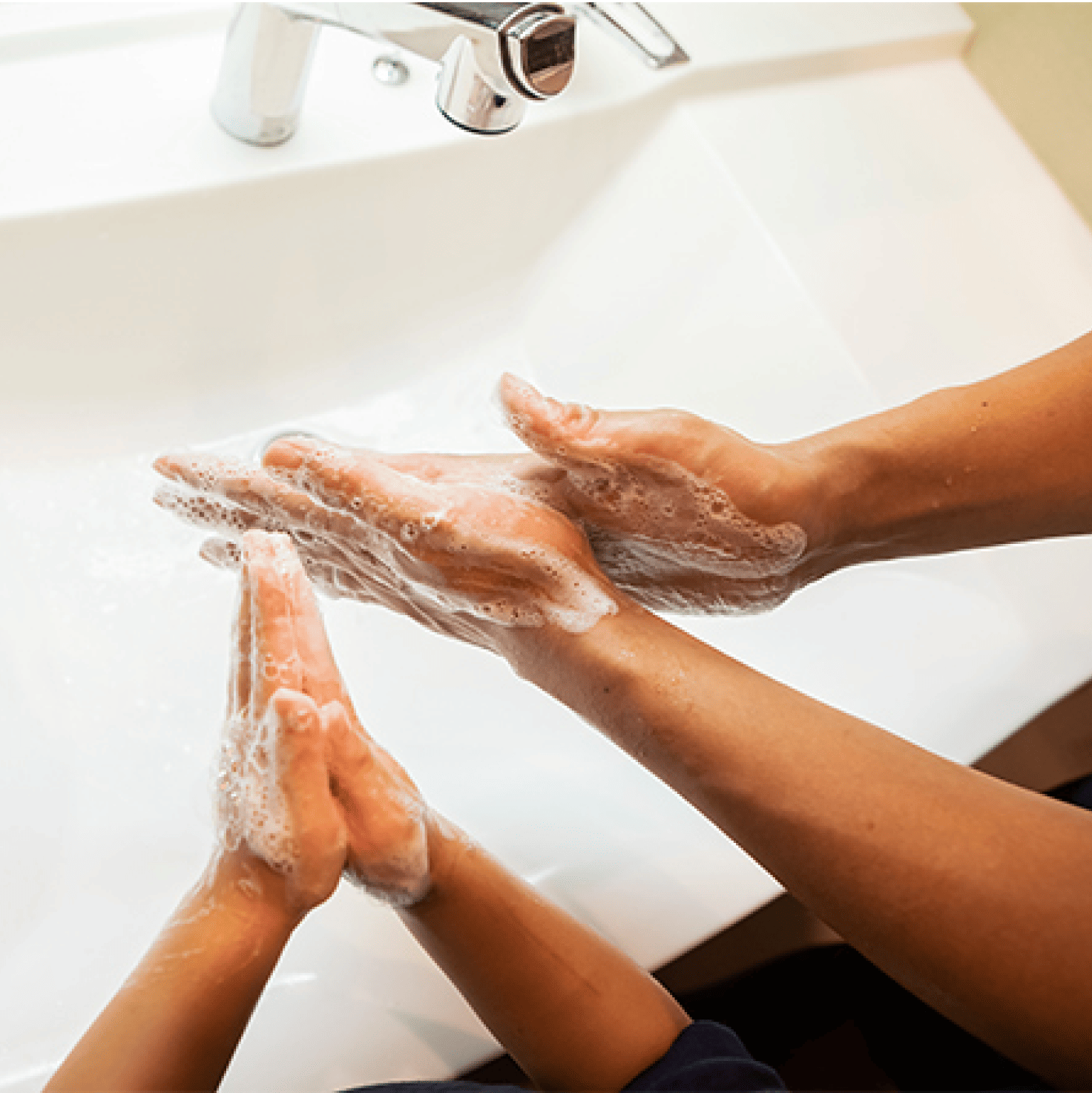Washing your hands is important. It’s one of the most effective ways of protecting yourself from illnesses, such as the flu and food poisoning. But while hand washing does a lot of good for your hygiene and health, overwashing can lead to dry and cracked skin on your hands.
Here, we’ll cover how to properly wash and care for your hands. We’ll also explore the common causes of dry hands, to make sure you’re getting to the root of the problem.
In this guide:
Why hand washing is so important
There's no way to keep yourself totally free of germs. In fact, all sorts of bacteria live on your skin and don't put your health at risk in the slightest. But washing your hands regularly can help to limit the spread of harmful viruses and bacteria to keep sickness at bay.
As you go about your day, you touch a lot of stuff, from your keys to the tips of your hair and plenty of other things you don't even think about. Along the way, your hands come into contact with a smorgasbord of germs, viruses and microbes. Keep in mind, even if your hands look clean, they may still be carrying viruses and germs, which aren’t visible to the human eye.
If you then touch your eyes, nose or mouth, these germs can pass into your body and may cause you to become sick. You can also transfer these germs to other surfaces, where someone else can pick them up, causing illness to spread. There’s no need to be too concerned about this though, as research has shown that washing your hands properly is one of the most effective ways to stop germs and disease-causing pathogens from spreading.
What causes dry hands?
A common cause of dry skin on your hands occurs from frequent handwashing. Dry or cracked hands occur when your skin dries out because it's lost the ability to hold moisture in. While this isn’t usually anything to worry about, it can lead to irritation.
Aside from overwashing, there may be several other factors that are responsible for dry skin on your hands. These include:
Harsh detergents and soaps
Soaps and detergents are designed to remove dirt and oil. In some cases, these can remove too much of your skin’s natural oils, damaging the skin barrier that helps hold moisture in your skin, leading to dryness.
Hot showers and baths
We all love a relaxing hot bath or shower, especially in the colder months. However, taking baths and showers that are too hot or too long can cause your skin to dry out.
Weather
During the winter, the drop in temperature and cold winds can affect your skin and leave it feeling dry. But it’s not just the cold weather that can affect your skin. When you come inside to warm up by turning the heating on, this can lower the humidity inside, which can also dry out your skin.
Skin conditions
It’s not always external factors that can cause dry skin on your hands. If you suffer from a skin condition – such as, eczema or psoriasis – you may be more likely to develop sensitive, even painful, and dry, flaky hands. It’s always best to see your doctor if you notice any persistent, painful symptoms, as you may need extra treatment.
Lifestyle and Occupation
Research shows that a weak skin barrier is directly linked with dry skin. There are several factors that could damage your skin barrier and make you more prone to dry and sensitive skin. These include:
Smoking
Having a poor diet
Stress
Strong sunlight and UV light.
People in certain occupations can also be more likely to suffer from dry skin on their hands. For example, healthcare professionals who wash and sanitise their hands frequently, those who come into contact with certain chemicals, or even irritate their hands by wearing gloves can often suffer from irritated and dry skin.
Why you should avoid dry skin on hands
Soap can't tell the difference between microbes and whatever else is on your skin. That means it ends up washing everything away, including your skin's natural oils. The skin's outermost layer, called the stratum corneum, is made up of skin cells held together by lipids (fats), the skin’s natural fats and other cells. This serves as a protective barrier against microbes and is vital in holding moisture in the skin..
To function properly, this layer should be between 10 and 30 percent water. If the skin cells don't hold the right amount of water, they can quickly become dehydrated and start to feel flaky, even start to crack and bleed. This gives germs a chance to slip through those openings, making you more vulnerable to infections.
Not only this, but dry and flaky hands can also be uncomfortable. Depending on the level of dryness, you can experience symptoms such as:
Itchiness
Swelling
Pain
Redness
Flaking
Scaling
Cracking
Blistering
Infection
How to wash your hands properly
Simply washing your hands the right way can help prevent viruses and infections. And moisturising your hands after you wash is important in preventing dry skin. So, what’s the best routine to follow?
Run your hands under clean, running water. It can be warm or cold, but avoid hot water, because it's drying.
Turn off the tap and soap u, with a gentle soap or cream based cleanser.
Scrub your hands for at least 20 seconds — be sure to get your palms, the back of your hands, between your fingers and under your nails.
Rinse under clean, running water.
Pat your hands on a towel or let them rest in the air for a moment so they're not dripping wet. Here's the key, though: don't let them dry all the way.
While your hands are still slightly damp, apply a moisturiser to lock in hydration.
How to moisturise and repair dry hands
To repair the dry skin on your hands, there are a few tips and tricks you can follow to ensure you’re moisturising as part of your daily routine.
Keep a tube of moisturiser next to your sink
By keeping moisturiser by the bathroom and kitchen sink, this will remind you to apply it every time you wash your hands. Try and use a hand cream formulated with glycerin or hyaluronic acid, as these skin-loving ingredients can retain moisture, even after washing.
Wear cotton gloves after moisturising
Wearing cotton gloves for 15 to 20 minutes after moisturising can help boost hydration. A hand mask can also help your hands absorb the lotion better, leaving you with extra soft skin.
Protect skin from water and chemicals
When you’re doing housework and washing up, wearing dishwashing gloves can help reduce hand irritation and dryness. This small change can also help protect your hands from hot water, dish soap, and any potentially harmful chemicals you may come into contact with when cleaning.
Apply moisturiser heavily at bedtime
You’re obviously not going to be washing your hands while you sleep (though that would be impressive). So, it makes sense to moisturise them before you go to bed to lock in moisture10. Our top tip – keep a moisturiser by your bedside table, so you remember to apply it before bed. Soon enough, it will become part of your everyday evening routine.
Dry hands FAQs
Why are my hands so dry?
You can have dry skin on your hands for a number of reasons. Washing your hands frequently, cold weather, stress, sun damage, and lifestyle factors can damage your skin’s outer layer, which can lead to dry and irritated skin.
How should you dry your hands?
Research says that you should dry your hands on a disposable paper towel or with a clean towel, as this can help prevent the spread of bacteria. Many scientists advise that you shouldn’t skip drying your hands and should avoid shaking your hands dry. This is because leftover water particles can contain bacteria, which are more easily spread when hands are even just a little wet.
Are there home remedies for severely dry cracked hands?
Keeping moisture locked in your skin is key. Moisturising your hands before bed then wearing cotton gloves for 15 to 20 minutes can help your hands lock in moisturise. To help prevent cracked and dry skin on your hands, remember to always protect yourself by wearing gloves when doing housework and to moisturise regularly throughout the day.







